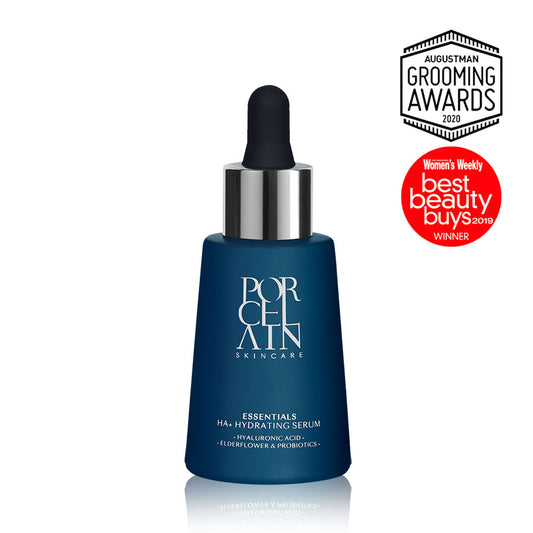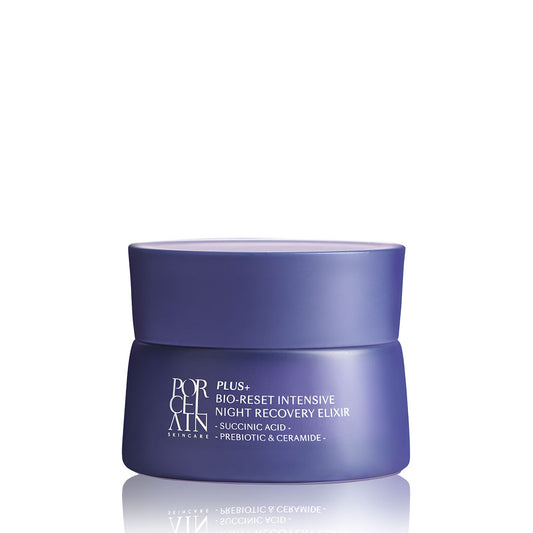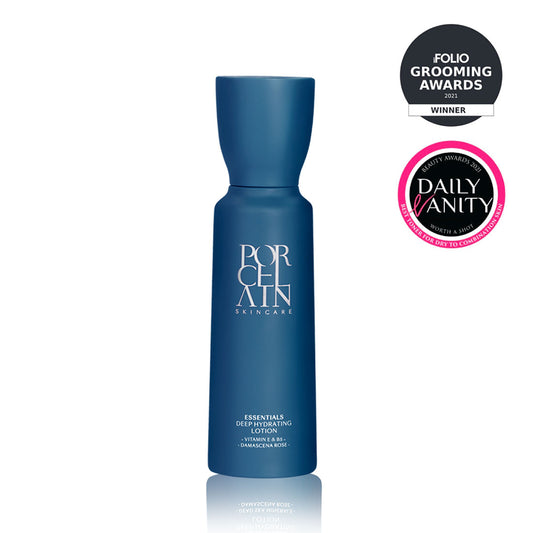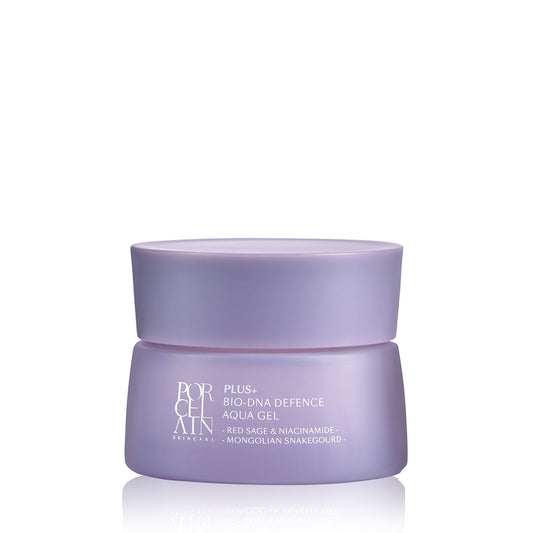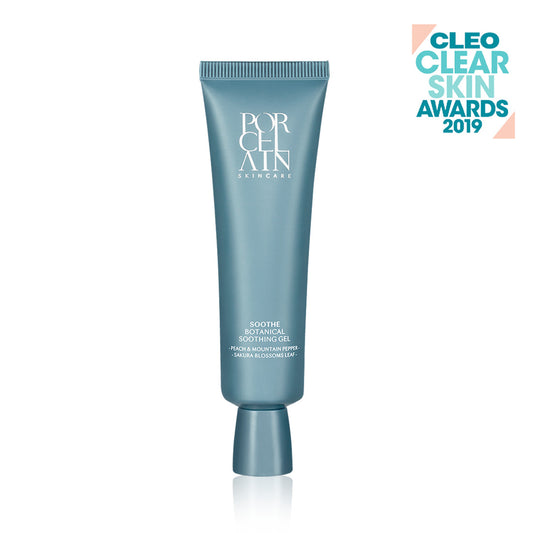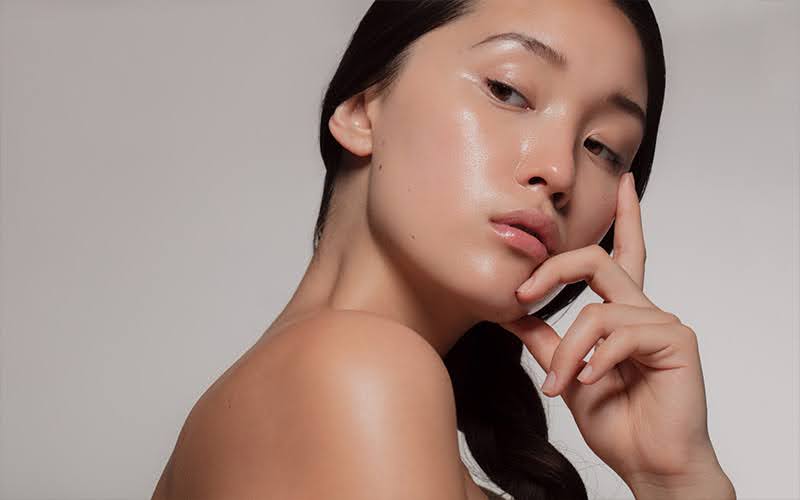Have you ever looked in the mirror and noticed your skin appears dull and tight with fine lines, despite having a consistent skincare routine? You might be surprised to learn that this is a sign of dehydrated skin.
Dehydrated skin is a common issue that can affect anyone, regardless of skin type. But with the right knowledge and care, you can revitalise your skin’s health and regain your confidence. In this guide, we’ll explore everything you need to know about this condition, including how to identify it, distinguish it from dry skin, and implement effective treatments for a dewy, hydrated complexion.
Understanding Dehydrated Skin
How to Tell If Your Skin Is Dehydrated

Unsure if you have dehydrated skin? Here are some signs you should look out for:
1. Pinch Test
One quick and simple way to assess if your skin is dehydrated is the pinch test. Gently pinch a small area of skin on your cheek and hold it for a few seconds. If your skin doesn’t bounce back immediately or shows signs of wrinkling when pinched, it's a strong indicator of dehydration. This is because healthy, well-hydrated skin is more elastic and resilient, whereas dehydrated skin lacks the moisture necessary to maintain its structure.
2. Texture Changes
A dehydrated complexion often feels noticeably rough or uneven to the touch. This textural change occurs when the skin loses its water content, causing it to lack the usual smoothness and suppleness. You may notice that your skin appears patchy, with certain areas feeling tighter or coarser than usual. These texture changes are often a key sign of dehydration, particularly if your skin isn’t responding to regular moisturising efforts.
3. Increased Sensitivity
If your skin suddenly becomes more sensitive or reactive to products that you’ve previously used without issue, dehydration may be the culprit. This type of skin suffers from compromised barrier function, which means it’s less able to defend itself against environmental aggressors or harsh ingredients. As a result, you might experience redness, stinging, or irritation more frequently, especially in response to skincare products or environmental factors like pollution or weather changes.
4. Fine Lines and Wrinkles
One of the more noticeable signs of dehydrated skin is the early or exaggerated appearance of fine lines and wrinkles. When the skin is deprived of water, it loses its plumpness and elasticity, making lines more prominent. Even younger individuals might start to see these lines forming, particularly around the eyes and mouth, due to the skin’s inability to retain moisture.
5. Dull Appearance
A lack of hydration often results in a dull, tired-looking complexion. The skin struggles to reflect light as healthy, well-hydrated skin does, leading to an overall lack of radiance. No matter how diligent your skincare routine is, if your skin is insufficiently hydrated, it may still appear lifeless and lacklustre.
Dehydrated Skin vs. Dry Skin: Know the Difference
Despite these telltale signs, it’s easy to mistake dehydration for dryness. This confusion may cause you to seek treatment choices that are not only ineffective but also exacerbate the underlying issue.

1. Underlying Causes
The first and most important difference between dry and dehydrated skin is their underlying causes. Dehydration is caused by the skin’s inability to retain moisture, which can result from various factors, such as insufficient water intake or the overuse of drying skincare products like strong cleansers or alcohol-based toners.
On the other hand, dry skin is characterised by a deficiency in natural oil, which serves as a protective layer that locks in moisture and keeps the skin soft. Without adequate oil production, the skin becomes more vulnerable to external aggressors, leading to dryness.
2. Symptoms
The symptoms of dehydrated skin and dry skin manifest differently. As mentioned earlier, dehydrated skin tends to present as dull, lacking radiance and suppleness, with noticeable fine lines that result from a lack of moisture. Dry skin, however, feels rough and tight, with visible flakes or patches of peeling skin. The lack of oil causes the skin’s texture to become uneven, and it struggles to maintain a smooth, healthy appearance.
3. Treatment
Different skin conditions require different skincare products and treatments. Combat dehydration by incorporating hydrating ingredients such as aloe, sodium, hyaluronate, and rose into your routine. You can also opt for products with phystosterols, ceramides, and natural oils to protect the skin from further dryness.
4. Short-Term vs Long-Term Management
Dehydrated skin is usually a temporary condition that can be addressed with simple lifestyle and skincare adjustments. Increasing water intake and using hydrating products can help your complexion regain its moisture balance and lead to noticeable improvement.
In contrast, dry skin is often a chronic issue linked to genetics, ageing, or long-term environmental exposure. Even with regular moisturisation, people with dry skin must consistently manage their condition to prevent discomfort.
How to Treat Dehydrated Skin
Now that you've identified the signs of dehydration, it's time to take action. Combating dehydration requires a comprehensive approach, from choosing the right skincare products to considering advanced treatments and making key lifestyle adjustments. But worry not — we’re here to guide you through the process.
5 Essential Skincare Tips

First and foremost, addressing dehydrated skin begins with a customised and consistent skincare routine.
1. Hydrating Cleanser
Start your skincare regime with a gentle, hydrating cleanser that cleans without stripping the skin of its natural oils. Many cleansers contain harsh surfactants that can dry out the skin, exacerbating dehydration. Instead, look for products like Porcelain’s Hydro Cleanser, which is formulated with soothing and hydrating ingredients like Sodium PCA. This cleanses impurities while preserving your skin’s moisture barrier, ensuring your skin remains soft and hydrated after every wash.
2. Hydration Boosters
After cleansing, apply a hydrating toner or lotion to your skin. These products can help prep your skin for subsequent products and provide an extra moisturising boost. Look for toners containing components known for their hydrating and soothing properties, such as hyaluronic acid or rosewater.
3. Moisturise Regularly
Regular moisturising is essential for treating dehydrated skin, and choosing the right product can make all the difference. Opt for a lightweight yet rich moisturiser containing soothing and hydrating components like aloe vera. For maximum effectiveness, make sure to apply your moisturiser immediately after cleansing and toning, while your skin is still damp.
4. Avoid Harsh Products
Skincare products like harsh cleansers, alcohol-based toners, and strong exfoliants can strip away moisture and cause further irritation. Products with alcohol or sulphates tend to dry out the skin, while over-exfoliating with abrasive scrubs can damage the skin’s protective barrier. Instead, stick to gentle, fragrance-free products that hydrate and protect your skin’s natural oils.
5. Protect From UV Rays
Use sunscreen daily to protect your skin from harmful UV rays, even on cloudy days or indoors. Sun exposure breaks down the skin’s moisture barrier, accelerates signs of ageing, and further aggravates your skin. Choose a broad-spectrum sunscreen with an SPF of at least 30, and ensure it has hydrating properties to safeguard your skin from UV-induced dehydration.
Advanced Facials and Treatments

While skincare can do wonders for your skin, professional facial treatments offer a more advanced approach. Here are some popular options that promise to nourish and combat dehydration.
1. Hydration Facial
Hydration facials are specifically designed to deliver intense moisture to the skin, making them an ideal treatment for dehydrated skin. This treatment typically begins with a deep cleanse to remove impurities, followed by gentle exfoliation to slough off dead skin cells and allow for better product absorption. An ampoule or a moisturising concoction is usually applied to the skin to deeply replenish the lost moisture. This is followed by a hydrating mask packed with ingredients like hyaluronic acid. Finally, use a nourishing moisturiser to seal in hydration and leave the skin feeling supple, plump, and revitalised.
2. LED Light Therapy Facial
LED light therapy facials, such as Porcelain’s ClearPurity™️ Sensitive Repair, are non-invasive treatments that address various skin concerns, including dehydration. The procedure uses specific LED light types tailored to various skin needs, each carefully chosen to enhance effectiveness. Additionally, it slows down excess oil production and boost skin hydration by restoring the skin’s barrier function.
This combination of antibacterial and hydrating effects makes the facial treatment particularly effective for those with oily, dehydrated skin, offering a solution that promotes balance and long-lasting hydration.
3. Cryotherapy Facial
Cryotherapy facials incorporate advanced medi-technology to apply temperatures as cold as -15°C to the face. This increases blood circulation, enhancing the delivery of nutrients and oxygen to skin cells and promoting a healthy glow. More importantly, it boosts the skin’s ability to retain moisture while improving skin texture, resulting in a more radiant and nourished complexion. Finally, the procedure reduces puffiness and inflammation, giving your skin a smooth, fresh appearance.
4. Oxygen Facial
Oxygen facials, like the Sun Rescue™ Facial Treatment, use oxygen therapy to hydrate and nourish the skin. By delivering a concentrated stream of oxygen directly to the skin, this treatment helps improve cellular hydration. Oxygen facials also regulate the skin’s pH levels, repair damaged skin, and boost collagen production. This multi-faceted approach promotes skin renewal, enhances moisture retention, and leaves the skin looking refreshed, plump, and youthful.
Lifestyle and Dietary Adjustments

Lifestyle adjustments are key to addressing the underlying causes and promoting long-term relief. Incorporating these tips into your daily routine will help nourish your skin from within.
1. Hydration
Drinking plenty of water is crucial for maintaining optimal skin hydration. Aim to drink at least eight glasses of water each day to help flush out toxins and keep your skin hydrated from the inside out. Incorporating fruits and vegetables with high water content into your diet, such as watermelon and cucumber, can also provide extra hydration and essential nutrients.
2. Healthy Fats
Healthy fats help maintain skin cell integrity and improve moisture retention. For example, omega-3 fatty acids — found in salmon, tuna, and avocados — help to strengthen the skin’s lipid barrier, which aids in retaining moisture and preventing dehydration. Make sure to incorporate these nutrients-dense fats into your diet.
3. Vitamins and Minerals
A balanced diet rich in vitamins A, C, and E and minerals like zinc is vital for supporting skin health.
- Vitamin A: Regulates skin cell growth and repair
- Vitamin C: Aids in collagen production and brightening
- Vitamin E: Provides antioxidant protection
- Zinc: For collagen production and wound healing
Include a variety of colourful fruits, vegetables, nuts, and seeds into your diet to provide your skin and body with the nutrients they need.
4. Manage Stress
Chronic stress can negatively affect your skin, causing dullness, irritation, and breakouts. To mitigate these effects, practice yoga, meditation, and deep breathing exercises to lower stress levels and promote overall well-being. Taking time for self-care and ensuring adequate rest can also support skin health and enhance your body’s natural ability to repair and rejuvenate.
5. Minimise Hot Showers
Hot showers may feel soothing, but they can strip your skin of its natural oils, leading to increased dryness and dehydration. To protect your skin, opt for lukewarm water instead of hot and limit the duration of your showers. Additionally, consider using a hydrating body wash or a moisturising lotion after your showers to lock in moisture and keep your skin feeling soft.
Frequently Asked Questions About Dehydrated Skin
1. Can oily skin be dehydrated?
Yes, oily skin can still lack water despite producing excess oil. If you have oily yet dehydrated skin, opt for lightweight, non-comedogenic moisturisers specifically formulated to balance hydration without clogging pores.
2. Is it possible to overhydrate the skin?
Overhydration is rare but can occur, leading to skin congestion and discomfort. This typically happens when excessive amounts of water or hydrating products are applied without allowing the skin to absorb and balance properly. This can clog pores, especially with heavy or occlusive products.
3. Can dehydration cause acne?
Yes, dehydration can contribute to acne breakouts. Dehydration may trigger increased sebum (oil) production to compensate for the lack of moisture, causing clogged pores and acne lesions. Additionally, this skin type is more prone to inflammation and a compromised barrier function, increasing the likelihood of breakouts. You can mitigate this by incorporating skincare products for acne-prone skin into your routine.
Rediscover Your Radiance with Porcelain
Achieving dewy, hydrated skin requires a thorough approach that addresses both internal and external factors. But remember—results take time, and consistency is essential. To see lasting improvements, focus on maintaining a dedicated skincare regime, scheduling regular facial treatments, and making small yet impactful lifestyle changes.
For expert skincare solutions tailored to your needs, consider visiting Porcelain, a leading facial spa in Singapore. We offer a range of targeted treatments and professional products designed to rejuvenate various skin types, including acne-prone skin, sensitive skin, dehydrated skin, and more. Our team of skilled professionals will provide personalised consultations and recommend the best course of action to help you attain your skincare goals.
Book an appointment with us today.


